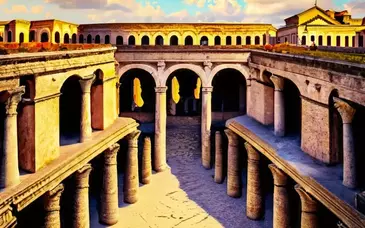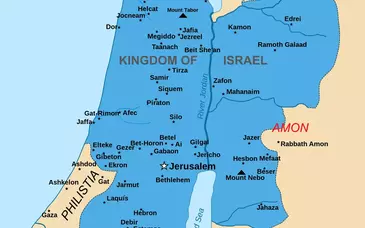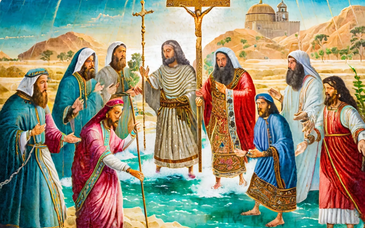1. Brief Account of Events Said to Have Occurred
In 49 BCE, in Rome, a civil war erupted between Pompey and Julius Caesar. At first, Hyrcanus II and Antipater supported Pompey, as most from the east did, but quickly switched allegiances, when it was discovered that Caesar and his allies had been victorious over Pompey, who had fled to Egypt but who was murdered in 48 BCE in Egypt. In gratitude for the help given to Caesar, he appointed Hyrcanus as ethnarch of the Jews in 47 BCE and Antipater procurator.
Caesar was murdered in 44 BCE by Marcus Junius Brutus and Gaius Longinus Cassius, part of a conspiracy to restore the Roman republic. Marcus Antonius, a consul and supporter of Caesar, sought to avenge the death of Julius Caesar, and another civil war broke out in the empire. Antipater and Hyrcanus allied themselves with Cassius, but Antonius with Octavian defeated Brutus and Cassius in 42 BCE. Antipater was murdered in 43 BCE, leaving his two sons Herod and Phasael to inherit the mantle of his power. Although they, as Antipater before them, had supported Cassius, after the death of Cassius, Herod, Phasael and Hyrcanus changed their allegiance, and gained the support of Antonius.
In 40 BCE Antigonus, the son of Aristobolus, having allied himself with the Parthians, and succeeded in taking control of Jerusalem. Hyrcanus and Phasael are taken prisoners, but Herod escaped to Masada. Phasael killed himself, and Antigonus had the ears of his uncle cut off so as to disqualify him as High Priest, a position that he assumed. In the meantime, Herod fled from Masada to the Romans, and in 40 BCE he came to Rome, gaining the confidence of Antonius and Octavian (Lepidus was out of the picture at this point). The Roman senate granted Herod the title of king of the Jews, and, in 37 BCE, he marched to Jerusalem with Roman military help, taking the city.

In 1971, a burial cave containing an ossuary was discovered in Jerusalem, north of the Old City. There was also an inscription in the cave, facing the cave's entrance, composed in Aramaic and using "old Hebrew" script. It reads:" I, Abba, son of the priest Eleaz(ar), son of Aaron the high (priest), I, Abba, the oppressed and the persecuted (?), who was born in Jerusalem, and went into exile into Babylonia and brought (back to Jerusalem) Mattathi(ah), son of Jud(ah), and buried him in a cave which I bought by deed."
It is possible and maybe even probable that the man buried in the ossuary is Antigonus, the last Hasmonean king (40-37 BCE), whom Herod deposed and arranged to have murdered. His Jewish name was probably Mattathiah, for Mattathiah was the used as the equivalent of the Greek name Antigonus. This identity is confirmed by the fact that Mattathiah's father is named as Judah, which corresponds to the Greek name Aristobolus: the father of Antigonus was Aristobolus II. (Aristobolus I identified himself as both Judah and Aristobolus on his coins.) In addition, the Hasmonean rulers used the unusual "old Hebrew" script on their coins. The identity of the priest Abba, who took upon himself the obligation to give Matthathiah (Antigonus) a proper burial, however, is unknown; he seems, however, to have fled Palestine after Herod's ascent to power, but to have returned to Jerusalem with the bones of Antigonus.

Diagram of the Hasmonean Dynasty
2. Primary Sources
2.1. Reading: Josephus, Antiquities 14.7.4-16.4; 123-491 (Translated by W. Whiston)
2.2. Reading: Josephus, War 1.9.1-18.3; 183-357 (Translated by W. Whiston)

Many postsherds were found at Masada. Of particular interest is a potsherd of an amphora (vessel used to store wine) on which is inscribed the name C. Sentius Saturninus (consul for the year 19 BCE), and "To Herod King of the Jews." It seems that Herod imported wine from Rome.
3. More Detailed Account of Events Said to Have Occurred with
Citation of Sources
(*=significant apparent disagreement in sources)
| Date BCE | Events | Sources |
| 49 | Civil war breaks out in the Roman empire between Pompey and the party supporting the senate and Julius Caesar and his supporters. (Pompey and Caesar were members of the first triumvirate, the third being Crassus who had died in 53 BCE fighting against the Parthians; the first triumvirate was formed in 59 BCE in response to the crisis in the Roman republic caused by the social unrest in Rome and Italy.) Caesar frees Aristobolus from prison in Rome and puts two legions under his command with the intention of sending him to Syria to fight against Pompey's forces. Aristobolus, however, is poisoned in Rome by Romans loyal to Pompey. In Syria, Q. Metellus Scipio, proconsul and father-in-law of Pompey, has Alexander, son of Aristobolus, beheaded. Initially, Antipater and Hyrcanus are allied with Pompey, as the east in general is (Appian identifies Jews as part of the eastern coalition in support of Pompey [B.C. , 2.71].) | Ant. 14.7.4; 123-26; War 1.9.1-2; 183-86; for sources on Julius Caesar, see Caes. B.C.; Appian, B.C., 2.1-106; Plutarch, Caesar; Suetonius, Div. Jul. |
| 48 | Caesar defeats Pompey at Pharsalus in Macedonia in 48 BCE; Pompey escapes to Pelusium in Egypt (hoping to find an ally in Ptolemy XIII) but is killed treacherously there disembarking on the beach by order of Ptolemy XIII. In Egypt, Caesar becomes involved in a war with Ptolemy XIII. Antipater and Hyrcanus switch allegiances and now support Caesar. (Antipater had the title of "governor" [epimeletes]; see the quotion from Strabo in Ant. 14.8.3; 139.) During Caesar's war with Ptolemy XIII, they render aid to Caesar's cause by helping the auxiliary troops sent by Mithridates of Pergamum who have been prevented from passing through Pelusium by its citizens (They are delayed at Ascalon). Antipater sends Jewish troops and obtains help from other rulers, enough to allow Mithridates to capture Pelusium and continue on his way. Antipater also convinces Jews in Egypt (near Memphis) who oppose Caesar not only to desist but to furnish provisions in Caesar's cause. To this end, he showed them a letter from the High Priest Hyrcanus instructing Jews to support Caesar. With Mithridates, Antipater leads troops loyal to Caesar, who eventually prevails over Ptolemy. Caesar is grateful to Antipater and Hyrcanus. | Ant. 14.8.1-2; 127-36; War 1.9.3-4; 187-92; see Appian, B.C., 2.90; Dio Cassius 42.47.1; Bell. Alex 26, 33, 65ff.; Plutarch, Caesar, 49; id., Pompey, 77-79; Caes. B.C., 3. 103-104; Suetonius, Div. Jul. 35; Appian, B.C., 2.64-90; Lucan, Pharsalia; Ps. Sol. 2 |
| 47 | Julius Caesar sails to Syria (in order to attack Pharnaces, king of Bosporus and son of Mithridates VI Eupator); while there, he confirms Hyrcanus as High Priest and bestows Roman citizenship on Antipater and exemption from taxes. (Josephus tries to prove from quotations from Strabo that Hyrcanus also took part in the military campaign in Egypt [Ant. 14.8.3; 138-39].) Antigonus, son of Aristobolus, appeals to Caesar for special consideration, and accuses Antipater of violence and lawlessness. Antipater defends himself, and Caesar ignores Antigonus' appeal. Afterwards, Caesar appoints Hyrcanus as High Priest and ethnarch of the Jews and Antipater as procurator (epitropos) of Judea. A decree is enacted by the Roman senate to this effect. Caesar also approves Hyrcanus' request to rebuild the walls of Jerusalem, torn down by Pompey. Josephus records the decrees of Caesar concerning the Jews (Ant. 14.10.1-8; 198-216); he also includes Roman decrees relating to the Jews from after Caesar's death (Ant. 14.10.9-10; 217-22). | Ant. 14.8.3-5; 137-44; War 1.9.5-10.3; 193-200; see Bell. Alex 34-40; 73-77; Suetonius, Div. Jul. 35; Appian, B.C., 2.91-92 |
| 47-45 | Julius Caesar leaves Syria for Rome, and Antipater returns to Jerusalem. Because Hyrcanus is incompetent, Antipater appoints his son Phasael governor (strategos) of Jerusalem, and entrusts Galilee to another son, Herod. Herod succeeds in capturing and executing Ezekias the Jewish brigand and his supporters, and earns the respect and admiration of all, including Sextus Caesar, then proconsul of Syria. In Rome, Julius Caesar is given autocratic powers by the Roman senate to carry through the necessary reforms to bring stability to the Roman empire; he is proclaimed dictator (an ancient political position of absolute power in times of crisis), in 46 BCE for ten years and in 45 BCE it becomes a life appointment. Caesar holds the consulship several times and is the pontifex maximus; he also takes the title imperator, a military position of general. The Roman republic de facto has come to an end. | Ant. 14.9.1-2; 156-62; War 1.10.4-5; 201-207; see Appian, B.C., 2.92-110; Suetonius, Div. Jul. 37-69; Plutarch, Caesar, 50-64; Dio Cassius 41-44 |
| 46-45 | The Jewish aristocracy in Jerusalem complains to Hyrcanus about the growing wealth and power of Antipater and his sons. In particular, they complain that Herod acted contrary to the Jewish Law by executing Ezekias and his supporters, and demand that Herod be brought to trial for murder before the Synhedrion. Hyrcanus summons Herod to stand trial, who comes before the Synhedrion with no contrition and accompanied by a bodyguard. During the trial only a certain Samaias speaks against Herod, the rest being intimidated by him (Samaias was a Pharisee, a disciple of Polion [Ant. 15.10.4; 370].) Sextus Caesar, proconsul of Syria, orders Hyrcanus to acquit Herod, even though the Synhedrion aims to put him to death, so that Herod is allowed to leave Jerusalem. He joins Sextus Caesar in Damascus, who then appoints him governor (strategos) of Coele-Syria and Samaria. Herod and an army then march on Jerusalem with the intention to depose Hyrcanus, but is dissuaded from this by Antipater and Phasael. | Ant. 14.9.3-5; 163-84; War 1.10.6-9; 208-215 *There is a discrepancy in Josephus' two accounts concerning Herod's trial. In Ant. 14.9.5; 177, he says that postponed the trial and secretly advises Herod to flee, whereas in War 1.10.7; 211, he says that Hyrcanus acquitted Herod. |
| 46-45 | While Caesar is fighting supporters of Pompey in Rome, Bassus Caecilius kills Sextus Caesar and takes control of Syria. Generals loyal to Caesar make war upon Bassus, who is besieged at Apamea. Because of support given to Bassus by the Parthians, Caesar's forces are unable to defeat Bassus decisively. Caesar sends L. Statius Murcus with three legions to Syria to assist in the war against Bassus. After an initial defeat at the hands of Bassus, with the help of the Roman governor of Bithynia, Q. Marcus Crispus (who brings three legions to Syria), Murcus besieges Bassus again at Apamea. Antipater supports Caesar during this struggle for supremacy in Syria, sending reinforcements under the command of his sons. | Ant. 14.11.1; 268-70; War 1.10.10; 216-17; see Dio Cassius 47.26-27; Livy, Epit. 114; Appian, B.C. 3.77; 4.58 |
| 44 | Julius Caesar is assassinated in Rome, among others, by Marcus Junius Brutus and Gaius Longinus Cassius, part of a conspiracy to restore the Roman republic. Marcus Antonius, a consul and supporter of Caesar, seeks to avenge the death of Caesar, and another civil war broke out in the Roman empire. In his will, Caesar adopts Octavius as his heir. | Ant. 14.11.1; 270; War 1.11.1; 218; see Suetonius, Div. Jul. 71-79; Plutarch, Caesar; Appian, B.C., 2.110-19; Dio Cassius 44-45 |
| 44-43 | C. Cassius Longinus is appointed governor of Syria by Caesar for 43 BCE, but, after Caesar's assassination, Marcus Antonius replaces him with Publius Dolabella. Cassius, however, refuses to comply, and proceeds to Syria, arriving before Dolabella. Cassius gains the support of both Murcus and Crispus, and even the legion under Bassus supports him. Cassius successfully resists the later attempt of Dolabella to take control of Syria in the name of Antonius. Cassius demands 700 talents in financial support from Judea, and Antipater assigns the task of raising the funds to his sons Herod and Phasael among others. Herod is the first to meet his financial goal, and brings the money to Cassius. Cassius sells into slavery the inhabitants of four towns that did not raise the required amount: Gophna, Emmaus, Lydda and Thamna. | Ant. 14.11.2; 271-76; War 1.11.1-2; 218-22; see Appian, B.C. 3-4 (for this period in general); Dio Cassius 47.21, 28-30; Cicero, ad fam. 12 |
| 43 | Acting in support of Hyrcanus, a certain Malichus persuades Hyrcanus' butler to kill Antipater by poisoning his drink; Antipater is dining with Hyrcanus when this occurs. Antipater's sons, Phasael and Herod forego revenge, since it may lead to a civil war. Some time before Antipater's death, Cassius appoints Herod to a position of authority in Syria, places troops under his command and promises to make him king of Judea upon the termination of the war. Herod, with the permission of Cassius, takes revenge on Malichus by having tribunes kill him while in Tyre. Cassius leaves Syria and defeats Dolabella at Laodocia in Asia Minor. | Ant. 14.11.3-6; 277-93; War 1.11.4-5; 225-28; see Appian, B.C. 3.78; 4.60-62; Dio Cassius 42.29-30; Cicero, ad fam. 12.13-15 (on Cassius' defeat of Dolabella) *According to War 1.11.4; 225 Herod is appointed prefect or procurator of Syria (epimeletes), whereas in Ant. 14.11.4; 280, he is strategos of Coele-Syria. |
| 42-41 | In 42 BCE, Cassius leaves Syria to assist Brutus in Asia Minor against the forces of Antonius. In the meantime, Herod and Phasael must suppress many small revolts in Judea, including an attempted coup by Antigonus, son of Aristobolus, who has the support of Ptolemy, son of Mennaeus. Hyrcanus supports Herod, because he is engaged to be married to Mariamme of Hasmonean descent (Mariamme is the daughter of Alexander, who is the son of Aristobolus II, and therefore great granddaughter of Hyrcanus I; Mariamme's mother is Alexandra, daughter of Hyrcanus II, brother of Aristobolus II.) (Herod divorces his first wife, Doris, an Idumean.) Later Brutus and Cassius go to Macedonia where near Philippi, their armies are defeated by Antonius and Octavius; both Cassius and Brutus kill themselves. (This begins the time of the second triumvirate, composed of Antonius, Octavian and Lepidus.) Antonius now takes control of the eastern territories formerly controlled by Brutus and Cassius. After the defeat of the conspirators, Octavius returns to Rome, while Antonius remains in the east. While in Bithynia, leading Jews send a delegation to Antonius complaining that Herod and Phasael rule Judea and not Hyrcanus. Herod, however, bribes Antonius to disregard their complaints. Hyrcanus II, High Priest and ethnarch, sends a delegation to Antonius when he is in Ephesus requesting that he release those Jews enslaved by Cassius and restore the territory taken by him, to which Antonius agrees. (Josephus preserves a copy of Antonius' decrees in this matter.) | Ant. 14.11.1-6; 297-323; War 1.12.1-4; 236-42; Appian, B.C. 4; Dio Cassius, 47.31-49; Plutarch, Brutus 28-53 |
| 41 | Antonius spends the winter of 40-41 BCE in Egypt with Cleopatra. On his way to Egypt with Cleopatra, whom he met in Cilicia, he stops in Syria, in Daphne near Antioch, where he is met by another delegation of 100 influential Jews who accuse Herod and those associated with him. Hyrcanus II, now almost related to Herod by marriage, supports Herod, and Antonius, rejecting the request of the delegation, appoints both Herod and Phasael as tetrarchs and entrusts to them the government of the Jews. Antonius takes fifteen of the delegation as prisoners. He appoints L. Decidius Saxa as legatus of Syria. Later 1,000 Jews meet up with Antonius in Tyre, where they make the same request. Antonius, already being bribed by Herod and his brother, orders that the Jewish delegates be killed. In spite of Herod's effort to prevent their deaths, some Jews are killed, while the rest flee to their homes. Antonius kills the fifteen prisoners from the first delegation. | Ant. 14.13.1-2; 324-29; War 1.7.5-7; 243-45; see Plutarch, Ant. 23-24; Appian B.C. 5.7/29-31; Dio Cassius 48.24; Livy, Epit. 127 |
| 40 | Antonius goes to Italy to fight against Octavius; after a few clashes, they agree to share power, Octavius in the west and Antonius in the east. (Lepidus the third member of the triumvirate has been deposed.) In 40 BCE, the Parthians seize control of Syria, Phoenicia and Palestine (including Judea). The invaders, having formed an alliance with him, install Antigonus (Mattathias), son of Aristobolus II, as king, after capturing Hyrcanus and Phasael through deception. Hyrcanus and Phasael go with Pacorus (possibly the Parthian general), as envoys to meet with Barzaphranes in order to bring about a cessation of hostilities in Jerusalem but are imprisoned by Pacorus and Barzaphranes. Herod, hearing of the Parthian treachery, escapes to Masada with members of his family and followers. Along the way he must fight against Parthians and Jews hostile to him. Herod leaves Masada for Petra, while the Parthians loot Jerusalem and Marisa. The Parthians install Antigonus as king, who then mutilates Hyrcanus' ear(s) with his own teeth in order to disqualify him as High Priest. Phasael dies at this time either by killing himself by smashing his head against a rock or by being poisoned after he unsuccessfully tried to kill himself in this way. | Ant. 14.13.3-10; 330-69; War 1.13.1-9; 248-69; Appian, Syr. 51; B.C. 5.52- 65; 5.75; Dio Cassius 39.1-2; 43.24-28; Plutarch, Ant. 25-30; Livy, Epit. 127 *In War 1.13.1; 248-49 it is Lysanias, son of Ptolemy, son of Mennaeus, who induces the Parthians to depose Hyrcanus in favor of Antigonus (in exchange for 1,000 talents and five hundred women), whereas in Ant. 14.13.2; 331, it is Antigonus who makes the promise. *In Ant. 14.13.10; 366 Antigonus cuts off both of Hyrcanus' ears, whereas in War 1.13.9; 270 he mutilates one ear by biting it. |
| 40 | Herod hopes to obtain money from Malchus (entrusted to him by his father Antipater), the Nabataean king, in order to redeem his brother Phasael from Parthian captivity. Herod is refused entry into Nabataean territory, and begins a journey to Egypt. Arriving in Rhinocoroura, he learns of his brother's death; Malchus has a change of heart towards Herod and sends envoys to him, but they cannot catch up to him. Herod next goes to Pelusium, where he seeks in vain for a ship to take him to Alexandria. He is escorted to Alexandria, where Cleopatra attempts to have Herod stay and lead an expedition against the Parthians. Herod, however, sets sail for Rome, where he meets with Antonius and Octavius, who induce the senate to appoint Herod king of the Jews. Herod offers Antonius a bribe in exchange for his support. Herod is supposed to have been surprised at this turn of events, since he assumed that the Romans would only appoint a Hasmonean as king. Allegedly, he came to Rome on behalf of his brother in law, Aristobolus (III), brother of his new wife Mariamme, whom he believed should replace Hyrcanus II. | Ant. 14.14.1-5; 370-89; War 1.14.1-4; 274-85; see Dio Cassius 48.41; Strabo 16.765; Appian, B.C. 5.75; Tacitus, Hist. 5.9 *In Ant. 14.14.5; 389, Josephus says that Herod's appointment as king occurred in the 184th Olympiad, which ended in summer of 40 BCE, but this may be too early. |
| 39 | Antigonus besieges Herod's family and supporters at Masada, about 800 in number under leadership of Joseph, Herod's brother. Antonius sends P. Ventidius Bassus to Syria as legatus, who defeats the Parthians and takes possession of Syria and Palestine. Ventidius, upon marching into Judea ostensibly to relieve the besieged at Masada, however, extorts money from Antigonus, and then withdraws most of his forces, leaving behind Silo with some soldiers to conceal his criminal act. (Antigonus is hoping for assistance from the Parthians.) Herod arrives in Ptolemais from Italy, assembles an army and begins his assault on Antigonus. Ventidius and Silo support him in this, having been persuaded to do so by Dellius, who was sent by Antonius to assist Herod. Herod takes control of Galilee, then Joppa and finally liberates the besieged at Masada. With Silo, he begins a siege of Jerusalem, but finds Silo's troops to be unreliable, so he dismisses them to winter quarters. | Ant. 14.14.6-15.3; 390-412; War 1.15.1-6; 286-302; on P. Ventidius Bassus, see Dio Cassius 48.39-41; Livy, Epit. 127; Plutarch, Ant. 33 |
| 38 | Herod subdues all resistance to him in Galilee. Ventidius sends for Silo and Herod to assist him in repelling another Parthian invasion. Herod sends Silo, but stays behind in Galilee to rid the region of brigands who have taken refuge in caves; the political allegiance of these men and their families in some cases, if any, is not stated (Possibly, they were pro-Hasmonean and therefore supporters of Antigonus). Moving on to Samaria, Herod appoints a certain Ptolemy as general of the region of Galilee; the men who formerly disturbed Galilee kill him, and Herod must once again subdue the region. Ventidius defeats the Parthians; he then besieges Antiochus of Commagene at Samosata, but is relieved from command by Antonius. Upon Antonius' request, Ventidius sends Machaeras with two Roman legions and 2,000 horses to assist Herod. Antigonus attempts to bribe Machaeras, who pretends to accept, but when he comes to Jerusalem (as a spy), Antigonus refuses him entry. Machaeras then withdraws to Emmaus, killing all Jews along the way in revenge for being spurned. Herod decides to go to Antonius to complain about Machaeras, who entreats Herod to leave behind his brother Joseph, to which Herod agrees. | Ant. 14.15.4-7; 420-38; War 1.16.1-7; 303-320; see Dio Cassius 49.19-22; Livy, Epit. 128; Plutarch, Ant. 34 *In Ant. 14.15.5; 427-28, Josephus says that some of the brigands surrendered, whereas War 1.16.4; 311 states that none did so voluntarily. |
| 38-37 | Overcoming resistance from the Parthians, Herod leads his own soldiers and others that he meets in Antioch to Samosata to arrive in time to be of assistance to Antonius. His coming turns the tide in the siege. Antonius appoints Sosius as legatus of Syria and Cilicia, and instructs him to give aid to Herod; he then departs for Egypt. He sends two legions to assist Herod, the second of which arrives while Herod is subduing Galilee. Meanwhile in Judea, Antigonus defeats Joseph and six Roman cohorts under his command near Jericho; there are no survivors, not even Joseph. Galilee also rebels against its landowners, as does parts of Judea. In Antioch Herod hears of the reversal of his fortunes. He reconquers Galilee easily, and moves to confront Antigonus at Jericho. Herod defeats part of Antigonus' forces under Pappus at Isana. With this victory, Herod has control of all of Palestine, except Jerusalem. Herod escapes an assassination attempt. | Ant. 14.15.8-13; 439-64; War 1.16.7-17.7; 321-41; see Dio Cassius 49.20-22; Plutarch, Ant. 34 |
| 37 | In the Spring, Herod besieges Jerusalem, but during the siege takes time to marry Mariamme in Samaria. Upon his return from his wedding, Sossius joins Herod with some reinforcements, and Herod himself brings more soldiers from Samaria. It seems that some of the besieged have expectations of divine deliverance. Attacking from the north, after forty days the besiegers take the first wall, beyond which lay the outer courts of the Temple and the lower city; at this time, Jews flee to the inner courts of the Temple and the upper city. After fifteen more days the second wall is taken, that separating the upper city from the rest of Jerusalem, as well as the inner courts of the Temple. The Roman soldiers and the Jews loyal to Herod massacre the population, and Antigonus surrenders to Sossius. Herod restrains the Roman soldiers, and prevents them from plundering the sanctuary and the rest of the city by promising them gifts. Herod bribes Antonius to kill Antigonus, fearing that he would convince the senate that he is the legitimate king, and not the commoner Herod. | Ant. 14.15.14-16.4; 468-91; War 1.17.8-18.3; 343-57; see Dio Cassius 49.22; Tacitus, Hist. 5.9 |
4. Questions
4.1. Are there any indications of the sources used in the two accounts of this period of Jewish history (see Ant. 14.8.3; 138-39)? Is Josephus' description of events in Jewish history consistent with what is known of Roman history of the same period?
4.2. Is Josephus' unacknowledged source, Nicolas of Damascus, too biased favorably towards Herod to be deemed reliable?
4.3. Does Josephus' religious biases—especially his pro-Pharisaic stance—influence his account of this period (Ant. 14.171-76)? Does his pro-Roman bias influence his account?
4.4. Are you satisfied that Josephus' accounts are an accurate reflection of Jewish political history of this period? Are his accounts complete? If not, what is missing?









